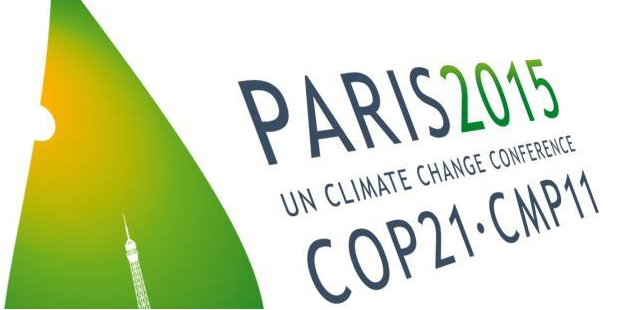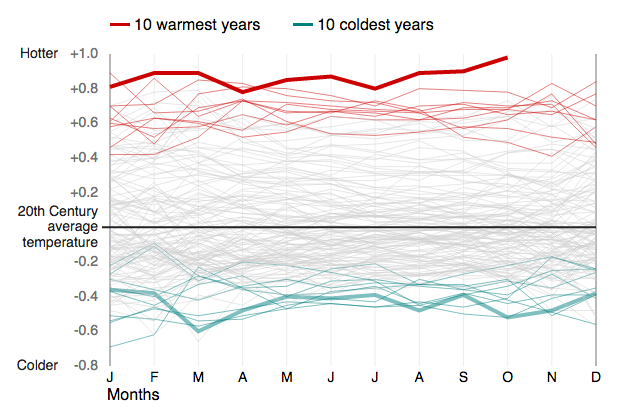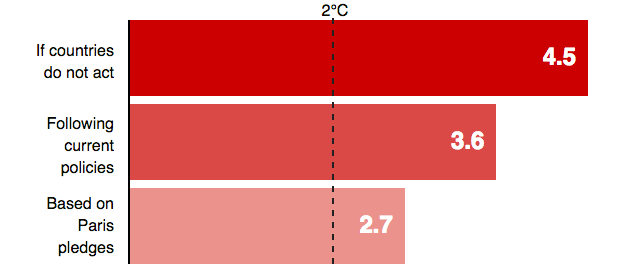Heads of State, Climate Specialists and Government Negotiators from 195 countries have been in Paris for the last two weeks outlining each nation’s commitments to reducing carbon emissions and limiting global warming. The global initiative is to avoid a future climate that risks submerged countries, abandoned cities and fields that can no longer sustain growth – all of which will cause political disruptions that trigger new conflict and even more desperate people seeking the safety of foreign nations.
In the initial days of the COP21 United Nations Climate Summit, the world’s leaders such as Barack Obama, David Cameron, Xi Jinping and Vladimir Putin have addressed delegations and expressed their unanimous support in mitigating the impact of global climate change.
The reason is simple – countries around the world are already experiencing the consequences of a changing climate. 14 of the 15 warmest years on record have occurred since the year 2000, and 2015 is on track to be the warmest of them all. Arable land and crop yields are in decline around the world due to intense desertification, deforestation and soil degradation. Sea levels are rising and shorelines are eroding because of the unprecedented rate in which our polar ice caps are melting. Now is the time for the world’s governments to react accordingly.
2015 is Forecast to be the Warmest Year Since Records Began
Source: BBC News (2015)
Having reached the final push for a global climate agreement that would establish a long-term strategy for dealing with climate change, attention has now been placed towards any issues that have remained unresolved. How countries finance efforts to reduce, stop and cope with the effects of climate is under question. The world’s largest economies want emerging nations to inherit the greater burden of cutting emissions, while they offer financing to the very poorest nations who are most affected. Finally, the overall climate objective for the summit has still to be decided. The target for limiting global rises in temperature now sits at 2°C above pre-industrial levels. The global average temperature has already risen by roughly 1°C.
Average Warming °C Projected By 2100
Source: BBC News (2015)
The United States, European Union, Brazil, Mexico and 100 other nations worldwide have therefore formed the ‘High Ambition Coalition’, an agreement which sets a temperature-rise limit to 1.5C through a strict system for assessing whether signatories adhere to and improve their pledges.
Clean energy took center stage at the preliminary sessions amidst the revelation that 7.1 billion tons of coal was burnt for our energy supply in 2014, releasing dangerous amounts of carbon dioxide into our atmosphere. The Global Adaptation Fund will see 20 of the world’s most prosperous nations offer $100 billion for research and development in renewable and sustainable technologies by 2020. India unveiled a Solar Alliance that will pump close to $1 trillion into Solar Energy around the world’s sunniest regions. 12 European nations also announced their commitment to further fund the world’s poorer countries to help their transition to low carbon sources of energy. Other pledges include:
- China will upgrade its coal-fired power plants to reduce the discharge of pollutants by 60% by 2020, in a move that will save 100 million tons of raw coal and cut carbon dioxide emission by 180 million tons annually.
- African governments announced their ambitious plan to install 10 gigawatts (GW) of renewable energy around the continent by 2020 and 300 GW by 2030
- The International Pact on Water and Climate Change Adaptation will ensure $20 million in technical assistance and potentially over $1 billion in financing water systems that are more resilient to climate impacts.
Alongside initiatives for clean energy, the world’s forests have also been a major theme throughout the Climate Summit. This comes as no surprise as the Amazon has the capacity to store 100 billion tons of carbon, equivalent to a decade’s worth of global emissions. Brazil, Germany Norway and the United Kingdom made a joint announcement to extend their climate and forest partnership until 2020, further increasing efforts to reduce deforestation and forest degradation in South America. The collective aim will provide $5 billion from 2015 to 2020, or $1 billion per year by 2020, if countries pursue their ambitious REDD+ deforestation programs. This would significantly increase pay-for-performance finance if countries demonstrate measured, reported and verified emission reductions.
Even the world’s most prominent businesses and private investors are becoming increasingly active in the renewable and sustainable space:
- Bill Gates, Mark Zuckerberg, Richard Branson, Jeff Bezos and 22 other billionaire investors have launched a “Breakthrough Energy Coalition” which will accelerate clean energy technologies coming into the market over the next decade.
- The Portfolio Decarbonization Coalition (PDC) convenes 25 of the world’s largest investors overseeing the decarbonization of $600 billion in Assets Under Management.
- 500 of the world’s most prestigious institutions, with a collective $3.5 trillion in net worth, will undertake divestment of some form from fossil fuels.
With attending countries and delegations invited to offer their own realistic commitments towards mitigating climate change, opposed to a one-size-fits-all benchmark mandated by the United Nations, the COP21 Climate Summit is already well on its way to becoming a success. The intention to fundamentally alter the way governments and businesses produce and consume, so that they place social responsibility and sustainability at the center of the world’s operations, is changing the very nature of human progress. Now that the Summit has been officially extended, we can finally see what a difference a day makes.


